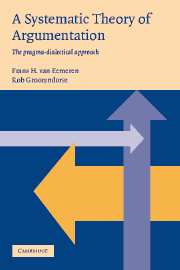7 - Fallacies
Published online by Cambridge University Press: 12 January 2010
Summary
The state of the art in the study of fallacies
A standard definition of a fallacy that was accepted until recently is that of “an argument that seems to be valid but that is not valid.” During the last few decades, however, argumentation theorists have raised several important objections to this definition: “Seems” involves an undesirable amount of subjectivity; “validity” is incorrectly presented as an absolute and conclusive criterion; the definition ignores the fact that some well-known fallacies are valid by the terms of present-day logical standards; the definition restricts the scope of the concept of fallacies to patterns of reasoning, leading to the exclusion of a large number of recognized fallacies. These objections explain why nowadays it is preferred in some quarters to give a broader definition in which a fallacy is regarded as a deficient move in an argumentative discourse or text.
In De sophisticis elenchis (Sophistical Refutations), Aristotle (1928c) puts the fallacies in the dialectical context of a dialogue in which a thesis is attacked by one party and defended by the other party. The refutation of the opponent's thesis is one way to win the debate. Seen from this perspective, fallacies are incorrect discussion moves in refuting this thesis. Sophistical Refutations deals with refutations that are only refutations in appearance (paralogisms) and that Aristotle considers characteristic of the style of argumentation of the Sophists, hence “sophisms.
Information
- Type
- Chapter
- Information
- A Systematic Theory of ArgumentationThe pragma-dialectical approach, pp. 158 - 186Publisher: Cambridge University PressPrint publication year: 2003
Accessibility standard: Unknown
Why this information is here
This section outlines the accessibility features of this content - including support for screen readers, full keyboard navigation and high-contrast display options. This may not be relevant for you.Accessibility Information
- 1
- Cited by
